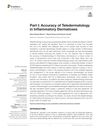Clinical Review of 80 Patients with Alopecia Visiting a Korean Medicine Clinic
January 2005
in “
한방재활의학과학회지
”
alopecia androgenetic alopecia alopecia areata telogen effluvium seborrheic alopecia hair loss DHT oily scalp itching dandruff traditional Chinese medicine stress irregular eating habits lack of sleep chronic neck pain temporomandibular disorders androgenic alopecia pattern baldness spot baldness hair shedding seborrheic dermatitis hair thinning dihydrotestosterone greasy scalp scalp itch scalp flakes TCM stress-induced hair loss poor diet sleep deprivation neck pain jaw pain
TLDR Most alopecia patients were young adults with oily scalps, often linked to stress and family history.
This study evaluated 80 alopecia patients who visited an oriental medicine clinic from January to August 2004. The types of alopecia observed were androgenetic alopecia (57.5%), alopecia areata (20.0%), telogen effluvium (16.3%), and seborrheic alopecia (6.3%). The male-to-female ratio was 1:1, with most patients aged 20-30. Adolescence was the most common onset age (63.8%), and hair loss duration was typically 1-3 years. Family history was significant in androgenetic alopecia (56.5%) and alopecia areata (25.0%). Stress (48.8%), irregular eating habits (21.3%), and lack of sleep (20.0%) were common self-reported causes. Associated conditions included chronic neck pain (58.8%) and temporomandibular disorders (55.0%). Most patients had oily scalps (70.0%) with symptoms like itching and dandruff. The study also categorized patients based on traditional Chinese medicine diagnoses.






